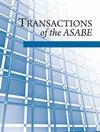循环侧向荷载作用下钢-木结构剪力墙性能预测
IF 1.4
4区 农林科学
Q3 AGRICULTURAL ENGINEERING
引用次数: 0
摘要
建立了钢包木结构剪力墙在循环荷载作用下的有限元分析(FEA)模型。该有限元模型将有助于确定框架后建筑对地震力的反应。该模型将节省设计系数的制定和试验规划的时间和金钱。本文介绍了循环侧向荷载作用下钢-木结构剪力墙的有限元模型分析结果。剪力墙模型包括梁单元对框架构件建模,等效正交各向异性平面应力单元对波纹钢包层建模,线性弹簧单元对框架构件间钉连接件建模,非线性迟滞弹簧单元对螺钉连接件建模。在循环荷载下,将钢板连接到木框架和钢板连接到钢板的螺钉接头进行了测试,以提供所需的本构关系。建立了一种改进的Bouc-Wen-Barber-Noori (BWBN)模型,以捕获循环加载下螺钉连接件的松弛、夹紧以及强度和刚度退化。通过将有限元模型与6种不同结构的剪力墙试验结果进行对比,验证了有限元模型的有效性。大多数荷载循环下的峰值抗剪强度预测值略高于试验值,尤其是有缝剪力墙。目视检查FEA预测的滞回载荷曲线表明,捏缩,强度和刚度退化被很好地捕获。本研究的结果表明,有限元模型在循环横向荷载作用下对不同的SCWF剪力墙结构进行比较研究的实用性。关键词:循环横向荷载,横隔板设计,后框架建筑,钢包木框架横隔板。本文章由计算机程序翻译,如有差异,请以英文原文为准。
Predicting Behavior of Steel-Clad, Wood-Framed Shear Walls under Cyclic Lateral Loading
HighlightsA finite element analysis (FEA) model was developed to predict behavior of steel-clad, wood-framed (SCWF) shear walls under cyclic loading.This FEA model will be useful in determining post-frame building response to seismic forces.The model will save time and money in developing design coefficients and planning experiments for SCWF shear walls.Abstract. This article presents finite element (FEA) model results of steel-clad, wood-framed (SCWF) shear walls under cyclic lateral loading. The shear wall model consists of beam elements to model framing members, equivalent orthotropic plane stress elements to model corrugated steel cladding, linear spring elements to model nail connectors between framing members, and nonlinear hysteresis spring elements to model screw connectors. Screw connectors attaching steel panels to wood framing and steel panels to steel panels at lap joints were tested under cyclic loading to provide the constitutive relationships needed. A modified Bouc-Wen-Barber-Noori (BWBN) model was developed to capture slack, pinching, and strength and stiffness degradation of screw connectors under cyclic loading. The finite element models were validated by comparing them with experimental test results of six different SCWF shear wall configurations. Predicted peak shear strengths for most load cycles were slightly higher than those from the experimental tests, especially for stitched shear walls. Visual inspection of the FEA predicted hysteretic load curves demonstrated that pinching, and strength and stiffness degradation were well captured. The results of this study demonstrate the utility of the FEA model for comparative studies of different SCWF shear wall constructions under cyclic lateral loading. Keywords: Cyclic lateral loading, Diaphragm design, Post-frame building, Steel-clad wood-frame diaphragm.
求助全文
通过发布文献求助,成功后即可免费获取论文全文。
去求助
来源期刊

Transactions of the ASABE
AGRICULTURAL ENGINEERING-
CiteScore
2.30
自引率
0.00%
发文量
0
审稿时长
6 months
期刊介绍:
This peer-reviewed journal publishes research that advances the engineering of agricultural, food, and biological systems. Submissions must include original data, analysis or design, or synthesis of existing information; research information for the improvement of education, design, construction, or manufacturing practice; or significant and convincing evidence that confirms and strengthens the findings of others or that revises ideas or challenges accepted theory.
 求助内容:
求助内容: 应助结果提醒方式:
应助结果提醒方式:


